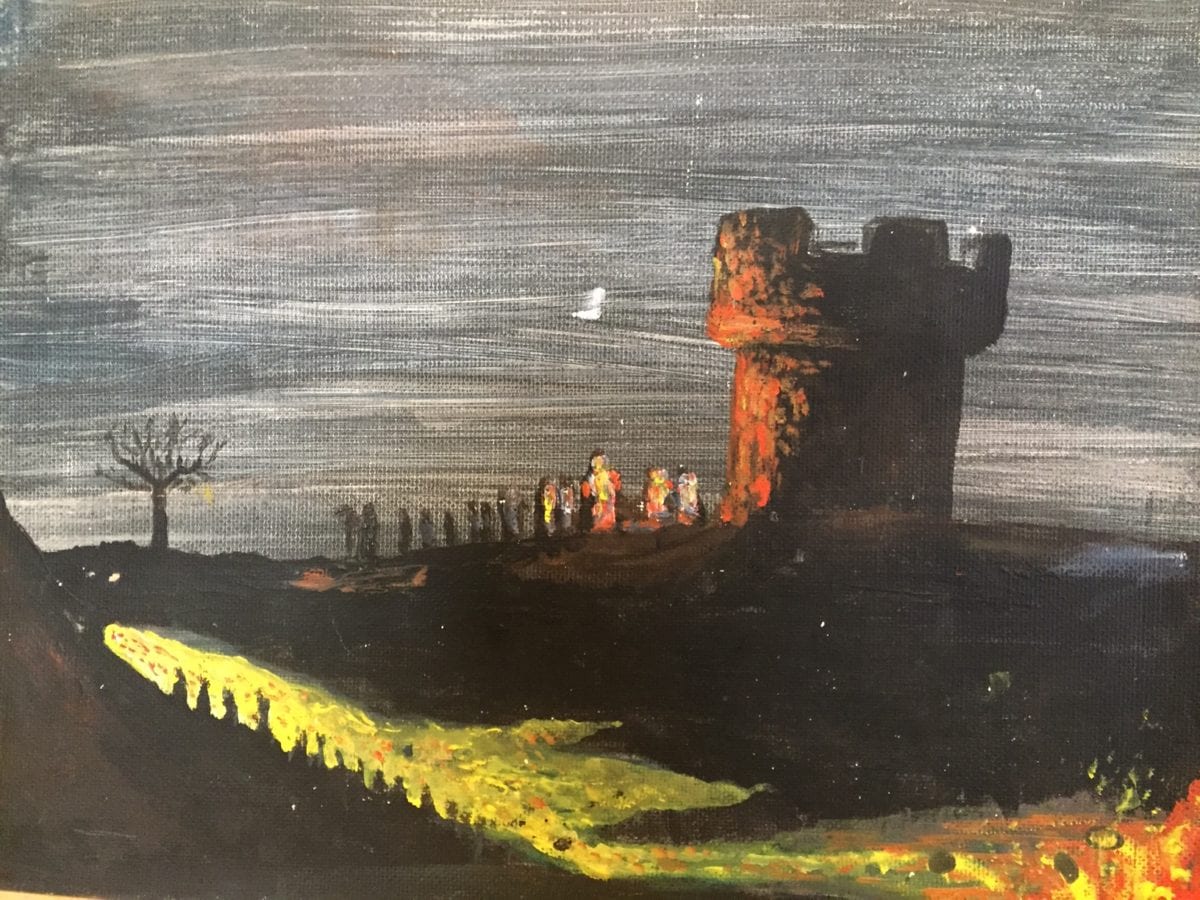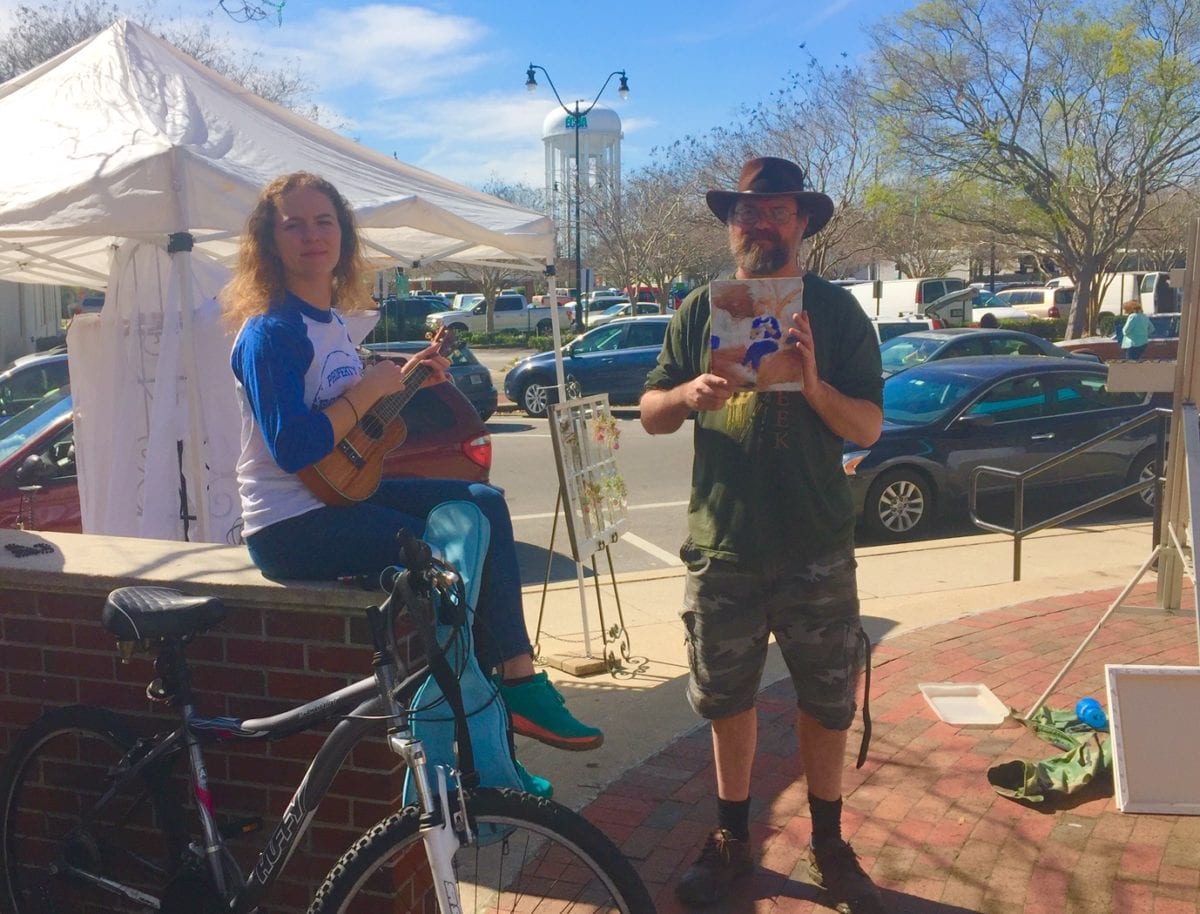
Black Death, a New American Journal graphic by Walter Simon [Art Market Place]
The Big Picture –
By Glynn Wilson –
PENSACOLA, Fla. — The sun was shining and everyone seemed happy and full of fun on Saturday at the Palafox Market even as the first two deaths from coronavirus were reported in the Sunshine state. Talk among progressives at the Polonzo Bistro included jokes that since COVID-19 seems to kill old men, maybe it will show up at a Trump campaign rally and take its toll on Trump voters, who are mainly old white men and their women.
Sure enough, according to CBS News and other news outlets on Sunday morning, it turns out an attendee at the conservative CPAC 2020 conference was diagnosed with coronavirus. The American Conservative Union tried to reassure people that he did not go to any events in the main hall, where President Donald Trump delivered a campaign speech.
But that did not prevent some wishfull thinking on the part of some who joked that it would be nice if the malidy would hit Senator Mitch McConnell’s home town, too.
Gallows humor is not uncommon in a situation like this, as I’m sure Frank M. Snowden, a professor emeritus of history and the history of medicine at Yale, would admit.
He’s the author of a new book called, Epidemics and Society: From the Black Death to the Present, and he examines the ways in which disease outbreaks have shaped politics, revolutions and well as racial and economic discrimination through history.
Epidemics have altered the societies they have spread through, he says, affecting personal relationships, the work of artists and intellectuals, man-made and natural environments.
According to a partial review and interview in The New Yorker, Snowden’s account is “Gigantic in scope, stretching across centuries and continents,” and his account seeks to explain the ways social structures have allowed diseases to flourish.
“Epidemic diseases are not random events that afflict societies capriciously and without warning,” he writes. “On the contrary, every society produces its own specific vulnerabilities. To study them is to understand that society’s structure, its standard of living, and its political priorities.”
What are the major ways epidemics have shaped the modern world?
“Epidemics are a category of disease that seem to hold up the mirror to human beings as to who we really are. That is to say, they obviously have everything to do with our relationship to our mortality, to death, to our lives,” Snowden says. “They also reflect our relationships with the environment — the built environment that we create and the natural environment that responds. They show the moral relationships that we have toward each other as people, and we’re seeing that today.”
Snowden says the World Health Organization is having a discussion about this, although the masses are not finding out about it from the mass media or social media.
“The main part of preparedness to face these events is that we need as human beings to realize that we’re all in this together, that what affects one person anywhere affects everyone everywhere, that we are therefore inevitably part of a species, and we need to think in that way rather than about divisions of race and ethnicity, economic status, and all the rest of it,” Snowden says. This “raises really deep philosophical, religious, and moral issues. And I think epidemics have shaped history in part because they’ve led human beings inevitably to think about those big questions.”
The outbreak of the plague, for example, raised the whole question of man’s relationship to God, he says.
“How could it be that an event of this kind could occur with a wise, all-knowing and omniscient divinity? Who would allow children to be tortured, in anguish, in vast numbers?”
It had an enormous effect on the economy, he said.
“Bubonic plague killed half the population of full continents and, therefore, had a tremendous effect on the coming of the industrial revolution, on slavery and serfdom.”
Epidemics also, as we’re seeing now, have tremendous effects on social and political stability, he says.
“They’ve determined the outcomes of wars, and they also are likely to be part of the start of wars sometimes. So, I think we can say that there’s not a major area of human life that epidemic diseases haven’t touched profoundly.”
That may seem hard to laugh at, but Snowden says “maybe history is best seen as comedy in retrospect.”
“But I don’t think what’s about to happen this next year with regard to this particular epidemic in the United States is going to be fun at all,” he said. “To have officials in the White House saying, ‘Oh, it’s nothing more than the common cold, we’ve got it under control,’ when they have nothing under control, as far as I can see, and they’ve put people in charge who don’t even believe in science.”
This is about to be anything but funny. According to data compiled by Johns Hopkins, there have been more than 105,000 confirmed cases of COVID-19 to date. More than 58,000 people have recovered, but more than 3,500 people have died.
So far there have been 20 deaths in the U.S. — 17 in Washington state and one in California, as well as the two in Florida. There are confirmed cases of the virus in 32 states and Washington D.C.
On the Grand Princess cruise ship, which is floating off the coast of San Francisco, 19 crew members and two passengers have tested positive for the virus. The ship is carrying more than 3,500 people from 54 different countries.
“Those that will need to be quarantined will be quarantined. Those who will require medical help will receive it,” Vice President Michael Pence said Friday, while President Trump, speaking Friday at the U.S. Centers for Disease Control and Prevention in Atlanta, said he would prefer not to allow the passengers onto American soil but will defer to the recommendations of medical experts.
“They would like to have the people come off. I’d rather have the people stay but … I told them to make the final decision,” the president said.
Florida Update
According to the latest alerts from the Florida Department of Health, all people who traveled on a river cruise on the Nile River in Egypt in February are being advised to self-isolate for 14 days. Several passengers in the U.S. recently developed symptoms and have been confirmed to be infected with coronavirus, which includes two presumptive positive cases in Florida.
Also, an 81-year old female in Manatee County has been identified as a presumptive positive, and this person is isolated and will continue to remain isolated until cleared by public health officials. She has a history of recent travel outside of the country.
A 66-year old female in Volusia County has been identified as a presumptive positive too, according to health advisorites now being issued by email to the press. This person is isolated and will remain so. She too has a history of recent travel outside the country, as well a 61-year old female in Okaloosa County.
Two people have died in Florida, including a patient from Santa Rosa County, and two new presumptive positive cases have been identified in Broward County.
Florida’s Republican Governor Ron DeSantis announced this week that an elderly man with a history of international travel and pre-existing health conditions tested positive. Baptist Hospital officials confirmed it, but local health departments have released no information about where the infected individual has been and who he may have been in contact with, citing patient privacy regulations. The departments have, however, indicated they are in the process of tracking down those contacts.
Baptist Health Care CEO Mark Faulkner said his team is focused purely on treating the virus, and claimed that patients, visitors and employees are “not at risk.”
Symptoms
The Florida Department of Health is working closely with the patients, potential close contacts of each case and health care providers to isolate and monitor persons who might have been exposed to COVID-19 and implement testing of anyone who may develop symptoms, including fever, cough or shortness of breath.
COVID-19 can spread from person to person through small droplets from the nose or mouth, including when an individual coughs or sneezes. These droplets may land on objects and surfaces. Other people may contract COVID-19 by touching these objects or surfaces, then touching their eyes, nose or mouth.
Symptoms may appear in as few as two days or as many as 14 days following exposure. Most people recover from the COVID-19 without needing special treatment. The elderly and those with underlying medical problems like high blood pressure, heart problems and diabetes, are more likely to develop serious illness.
There is currently no vaccine to prevent COVID-19. The best way to prevent illness is to avoid being exposed to this virus. Preventive actions to help impede the spread of respiratory diseases, include:
Avoiding close contact with people who are sick.
Staying home when you are sick and avoiding contact with persons in poor health.
Avoiding touching your eyes, nose and mouth with unwashed hands.
Covering your cough or sneeze with a tissue, then disposing of the tissue.
Washing your hands often with soap and water for at least 20 seconds, especially after going to the bathroom, before eating, after blowing your nose, coughing or sneezing.
If soap and water are not readily available, use an alcohol-based hand sanitizer with at least 60 percent alcohol.
Always wash hands with soap and water if hands are visibly dirty.
Clean and disinfect frequently touched objects and surfaces using a regular household cleaning spray or wipe.
The CDC does not recommend that asymptomatic, healthy people wear a facemask to protect themselves from respiratory diseases. Facemasks should be used by people who show symptoms of COVID-19 to help prevent the spread of the disease to others. The use of facemasks is also crucial for health workers and people who are taking care of someone in close settings (at home or in a health care facility).
A person that experiences a fever and symptoms of respiratory illness, such as fever, cough or shortness of breath, within 14 days after travel from China, Italy, Iran, South Korea, Japan and any other destination under CDC travel advisory should call ahead to their health care provider and local county health department (CHD) and mention their recent travel or close contact.
If a person has had close contact with someone showing these symptoms who has recently traveled from this area or been in contact with a person with laboratory-confirmed COVID-19, they should call ahead to a health care professional and the county health department. The health care professional will work with the Department to determine if the person should be tested for COVID-19.
For more information, go here.
Watch this video for more about the virus:















You folks should be advisers to the White House as you are more informative, factual, and credible! The only good thing that may result from this horrible tragedy is that COVID-19 now gives a face to the need for universal health coverage-if we veterans can get it; if Congress can have it; why can’t others i.e. the poor and what is left of the middle class?